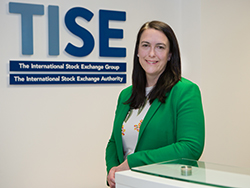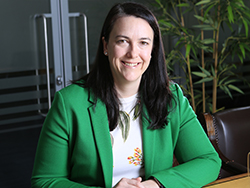 After overseeing a record year of listings growth, you’d think the CEO of The International Stock Exchange would take a breather. But Fiona Le Poidevin is having none of it. In a fast-changing and competitive landscape, she says complacency is off the agenda
After overseeing a record year of listings growth, you’d think the CEO of The International Stock Exchange would take a breather. But Fiona Le Poidevin is having none of it. In a fast-changing and competitive landscape, she says complacency is off the agenda
What’s your background and how did you get to where you are now?
I graduated from Durham University with a mathematics degree. Having been born and brought up in Guernsey, like many 18-year-olds from here, I wanted to escape to the big smoke post-university. I started my career with PwC in London, where I did both audit and corporate tax advisory, primarily in the financial services sector and then for FTSE 250 clients.
I wasn’t ready to come back for quite a while and then decided to make the leap, joining PwC Guernsey for what was meant to be 18 months – and that was 15 years ago! When I came back, all the plans for tax reform were going on for the zero-10 regime. I was heavily involved in that.
It’s quite a unique experience in the tax world to see a regime completely reformed so it was quite an interesting one for me. There were so many opportunities arising that I stayed.
After PwC, I spent four years at KPMG before I saw an opportunity at Guernsey Finance. I was ready for a change, so I joined Guernsey Finance in 2011 and I was Chief Executive there from 2012 to the end of 2014. Then I joined The International Stock Exchange (TISE) – at the time, the Channel Islands Securities Exchange – in January 2015.
In a nutshell, what does TISE do?
We’re a stock exchange. Essentially, we facilitate capital flows between investors and companies by providing a platform for investors to invest in various securities and for companies to get access to that capital. We have a number of products that are listed, some in the form of debt – for example, corporate bonds and high-yield bonds – or in the form of equity, such as investment funds or trading companies.
It’s very much a global business and institutionally focused, although we do have retail products as well. But the institutional focus really reflects the business in the Channel Islands across the financial services industry, which is similarly heavily institutional in focus.
What would you say is TISE’s USP?
There are a few things. We have a strong focus on client service and the expertise of our listing sponsors – the law firms, fund administrators, corporate service providers and so on who bring the issuers to market.
I think we’re also very cost-effective compared with other exchanges. We’re a transparent, regulated marketplace that is located in Europe, but not within the European Union (EU), which gives us an ability to be more proportionate with our regulation and to tailor it better for particular types of business.
Are you seeing any trends in the types of securities that are being listed on the exchange?
We see a lot of debt and investment funds in a variety of different asset classes and different types of industries. However, our particular focus in the past couple of years has been high-yield bonds, where we’ve seen more than 170 securities listed during that time, and also real estate investment trusts (REITs) – we now have more than a quarter of the UK market for those vehicles.
There have been a number of factors that have led to the growth in REITs. There’s just the general movement in interest rates and the demand for yield by investors. Then when we had the Brexit vote in 2016, the pound fell significantly, which led to international investors seeing UK real estate at what was effectively a 15% or 20% discount.
Therefore, lots of international money was coming into the UK real estate class and REITs were being used to set those vehicles up in order to invest. TISE has now been named the alternative to the London Stock Exchange (LSE) in terms of listing these types of vehicles. In 2018, we listed more REITs than the LSE, which was a fantastic achievement.
TISE experienced record growth in listings during 2018. What’s behind this performance?
We’ve been delighted with the growth and I think there’s been a huge amount of work from my team in terms of our focus on marketing, but there’s also been a focus on product development.
Quite a significant amount of growth is probably down to taking market share from others. I don’t think we can break records every year, but we hope our success will continue at the exchange because it benefits the wider financial services industry in the Channel Islands, which is good for everybody.
You currently have a presence in the three Crown Dependencies. Is expansion into other jurisdictions seen as a potential growth option?
We do hope to expand further in the future and we’re always seeking out opportunities in that regard, but we already consider ourselves international in nature just based on the diversity of the geographical markets from which our listings are originating. I think we will see more expansion, but it’s a case of concentrating on the markets where the work’s coming from.
On to Brexit. Everybody’s talking about a ‘no-deal’ scenario at the moment, but what impact would a no-deal Brexit have on TISE?
I think that, typically, the Channel Islands follows the UK in terms of prosperity, so it’s in our interests in the Channel Islands to want the UK to come out well from this situation. But business is global in the Channel Islands and it’s not all about Brexit. That applies to the wider industry as well; not just the exchange.
Increasingly at the exchange, we have very good relationships in the rest of the EU. We were recognised by BaFin, the German regulator, in 2017 for our regulatory standards, for example.
So, I think that it’s important to be mindful of Brexit, but it’s also important not to neglect the wider global markets that are out there because that’s where increasingly we are seeing the bigger opportunities coming from.
 You’ve also described Brexit as an opportunity for TISE. Tell us more about your thinking here.
You’ve also described Brexit as an opportunity for TISE. Tell us more about your thinking here.
I mentioned our success in the REITs market, which has partly been boosted by the Brexit effect. I think the other area where Brexit essentially strengthens our argument is the need in the UK for capital to support small and medium-sized enterprises (SMEs), which are really the ‘engine’ of the UK economy.
So in January, for example, we listed Likewise Group, which is a relatively small UK company. They’ve raised £7 million on the exchange to fund their general growth and future acquisitions.
In the current environment, with Brexit, the UK needs such capital for growth, jobs and stability and, hopefully, we can contribute to that at TISE.
Moving away from the UK, you’ve seen a substantial increase in turnover from overseas. Why is this?
There’s been a wider industry focus across the Channel Islands on international markets over the past few years and that’s starting to reap rewards. So, for example, our sponsors are now marketing themselves and their businesses much more widely, which is then creating those wider opportunities for us too.
TISE itself has really changed its own marketing focus over the past five years – we now promote much more on a global basis and we’ve started to see work coming in from those various jurisdictions.
We also look at the Guernsey Finance and Jersey Finance strategies and the various jurisdictions in which they’re promoting the islands. Because if we can get a critical mass of businesses, all in the same jurisdiction, marketing services that we provide, we hope that leads to more work coming through the door.
So, for example, we’ve been looking more at the US over the past couple of years, as well as South Africa, the Middle East and Asia.
The US Securities and Exchange Commission (SEC) recently recognised TISE as a Designated Offshore Securities Market. What’s the significance of this?
The SEC’s move recognises our equivalent regulatory standards. It makes some processes less onerous for those people issuing securities that don’t need to be approved by the SEC. In other words, the SEC is relying on our regulatory standards, which should create a smoother process for clients who are listing their securities with us.
From a reputational perspective, it’s an incredibly positive development for the Channel Islands and the exchange to be recognised in this way.
You mentioned that your record growth in 2018 was partly down to bringing new products to market, one of which was TISE GREEN. How has the market responded to this?
It’s early days still, but there’s been a huge amount of interest from issuers, investor groups and the industry in general in the Channel Islands. We already have a lot of investment funds that invest in environmentally positive assets so we have a base to work from in that regard.
One of the things that’s important on green and sustainable finance is the ability to measure the positive effect that some of this financing will have.
That’s partly the reason why we set up TISE GREEN – to provide some sort of consistent measurement of the environmental impact of green investments and give visibility to those securities that create that positive environmental impact so that investors are hopefully better informed and have more choice.
Do you plan to launch anything else in the green segment?
I see green and sustainable finance as a subset of the wider impact investment movement, so I can see the potential for us to either open the segment wider or potentially create another segment for other types of impact investment.
We have social housing funds in the Channel Islands, including listed on TISE. We have a number of other social impact type initiatives that are invested in through the private equity industry here, for example. So there is that wider impact investment angle to consider, but I think that green and sustainable finance is a sensible place to start.
Beyond impact investing, do you have any other product offerings in the pipeline?
Well, partly in response to TISE GREEN, we recently updated the listing rules to better accommodate retail debt products. That will open up not just the green offering, but also a wider offering of other retail type products.
TISE is also doing a lot of work on digital assets. We’ve already listed the world’s first regulated Bitcoin fund on an exchange worldwide. We have other similar queries in the pipeline. We’ve also become home to the first ever regulated exchange listing of notes digitised on a blockchain. Now, we’re looking at things such as initial coin offerings and security token offerings.
The other area is not necessarily new products, but we are hoping to see more Channel Islands companies listing. We saw PraxisIFM list back in 2017. They’ve raised £40 million and made five acquisitions with that funding, so they are really going from strength to strength.
We would love to assist more success stories like that. We’ve had quite a few enquiries during the past year, so I’m hoping to see further Channel Island companies listing this year.
On the subject of digital assets, why do you think you’re able to attract ‘world firsts’ in areas like Bitcoin and blockchain?
Guernsey and Jersey both have strong digital strategies and if the jurisdictions are open to this type of business, then we want to be as well. I’m regularly receiving enquiries as a result of the promotion and the open door that Guernsey and Jersey have. People are coming to us voluntarily with ideas.
In response, we are very much trying to be an innovative exchange. We’re very open to ideas. We try to keep abreast of emerging trends and be nimble and adapt, introducing new products in a relatively short space of time. The relationship we have in place with our stakeholders, such as our sponsors, means that they are willing to bring new ideas to us as well.
That said, there are a huge number of risks in the crypto and digital asset space that need to be taken seriously, but we want to look for the good business within that and the islands as a whole are very much the same. It’s about working with our regulators, working with industry and making sure we are educating ourselves and are technically competent to deal with what comes through the door.
Looking ahead, what do you see as the main opportunities for TISE?
There are a few areas. One is continuing to look for ways to boost liquidity. We’re looking at our systems, we’re engaging with investors, we’re looking at the ways in which trading is changing. We also need to appeal to the next generation of investors and watch very closely where the capital markets are going, and therefore issues such as digital assets are key.
Finally, what’s going to keep you awake at night?
We’re in a fast-changing, competitive landscape. We’re seeing new marketplaces pop up that are not your traditional exchange – things like crowdfunding. We’re seeing quite a lot of disintermediation, which is laudable but also comes with certain risk. I think, also, with the perceived cost of listing and how difficult it can be, there’s been a trend around companies wanting to stay private because they have all of these alternatives available to them.
In a marketplace that’s moving this quickly, we need to keep up with the pace that we’ve already set, and I think that applies across the Channel Islands. We can’t be complacent. We’ve got to be hitting these markets and showing what we can do as jurisdictions.
FACT FILE
 Name: Fiona Le Poidevin
Name: Fiona Le Poidevin
Age: 42
Position: Chief Executive, The International Stock Exchange Group
Studied at: The Ladies College, Guernsey; The College of St Hild & St Bede, Durham University
Graduated in: Mathematics
Married to: Dave Jones, IT consultant
Hobbies: Painting in acrylics, walking, attending local events such as the Sark Folk Festival
Did you know: I played basketball for the university first team and captained my college